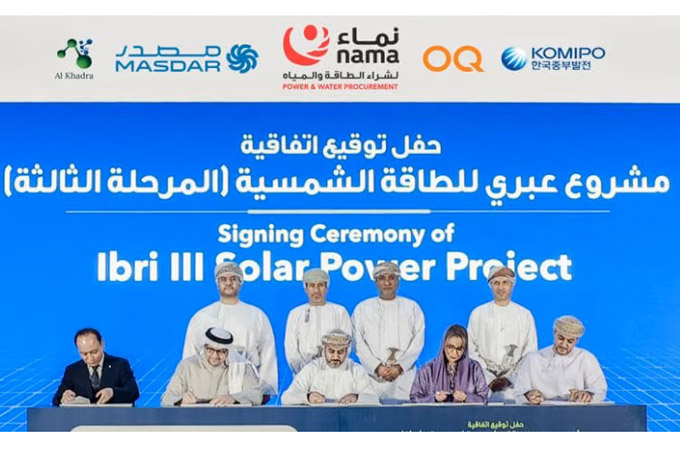Nama Power and Water Procurement (PWP) has signed an agreement for the development of Oman’s first utility-scale solar and battery storage project with the consortium of Abu Dhabi Future Energy Company PJSC – Masdar, Al Khadra Partners, Korea Midland Power Co. Ltd (KOMIPO), and OQ Alternative Energy (OQAE), Oman’s national champion for renewable energy.
Masdar, a global clean energy leader, will lead the consortium developing the Ibri III Solar Independent Power Project, which combines a 500-megawatt (MW) photovoltaic (PV) plant with a 100-megawatt-hour (MWh) battery energy storage system (BESS). The scope of the project includes design, construction, ownership, financing, operation and maintenance of the plant and storage system, said a Wam news agency report.
The power purchase agreement (PPA) for the project, awarded under the auspices of Eng Salim bin Nasser Al Aufi, Minister of Energy and Minerals, was signed at an event in Muscat on Monday by Ahmed bin Salim Al Abri, CEO of PWP, Mohamed Jameel Al Ramahi, CEO of Masdar; Ghalib Al Maamari, Acting CEO of OQAE; Hind Suhail Salim Al Mukhaini Bahwan, Chairperson of Al Khadra Partners; and Lee Young-jo, CEO of KOMIPO.
Salim bin Nasser Al Aufi, Oman's Minister of Energy and Minerals, said: "We are pleased to celebrate the signing of the agreement for the Ibri III Solar Power Plant, a milestone in the Sultanate of Oman’s transition towards renewable energy. This strategic project, covering an area of nearly 10 million square meters with a generation capacity of 500MW, and battery energy storage system (BESS) capacity of 100MWh, embodies our commitment to achieving the objectives of Oman Vision 2040 and reaching Net Zero by 2050.
“With an investment of around OMR115 million ($299 million), the project reflects the confidence of our partners and investors in Oman’s business environment. The project will reduce carbon dioxide emissions by approximately 505,000 tonnes annually, and contribute up to an additional 4 percent of renewable energy in the total electricity generation mix.
“The signing of this agreement marks a significant achievement in renewable energy from both technical and economic aspects. It also delivers an inspiring message that the Sultanate of Oman is steadily advancing towards a sustainable future, built on energy diversification, enhanced energy security, strengthened economic competitiveness, and the consolidation of Oman’s position as a regional hub for clean energy."
Ahmed bin Salim Al Abri, Chief Executive Officer at Nama Power and Water Procurement, said: “At Nama Power and Water Procurement Company, we take great pride in collaborating with our strategic local and international consortium partners on the Ibri III Solar Power Project. This project not only reaffirms Nama Power and Water Procurement’s commitment to the transition towards renewable energy but also stands as a practical model of the Sultanate of Oman’s vision to synergise efforts between the public and private sectors in bringing about a qualitative transformation and state of art solution in the field of renewable energy and storage systems. It forms part of the national endeavours to achieve a sustainable economic and social future."
Mohamed Jameel Al Ramahi, Chief Executive Officer, Masdar, said: “Masdar is proud to lead the consortium developing the Ibri III Independent Power Project, which will support the Oman Vision 2040 objectives of diversifying the nation’s economy and energy resources. This project will help the Sultanate of Oman to address the energy needs of today, while helping to create new jobs, drive socioeconomic growth and prepare for the growing demands of tomorrow. Alongside our consortium partners, we look forward to working closely with Nama Power and Water Procurement and the Government of Oman in developing this project and delivering sustainable, secure energy to the people of Oman.”
The Ibri III project is a key element in Oman’s policy to diversify energy resources to meet growing electricity demand, with Oman Vision 2040 including the objective of generating 30 percent of electricity from renewables by 2030. Once operational, Ibri III will produce enough electricity to power around 33,000 homes, while avoiding approximately 505,000 tonnes of carbon dioxide annually.































